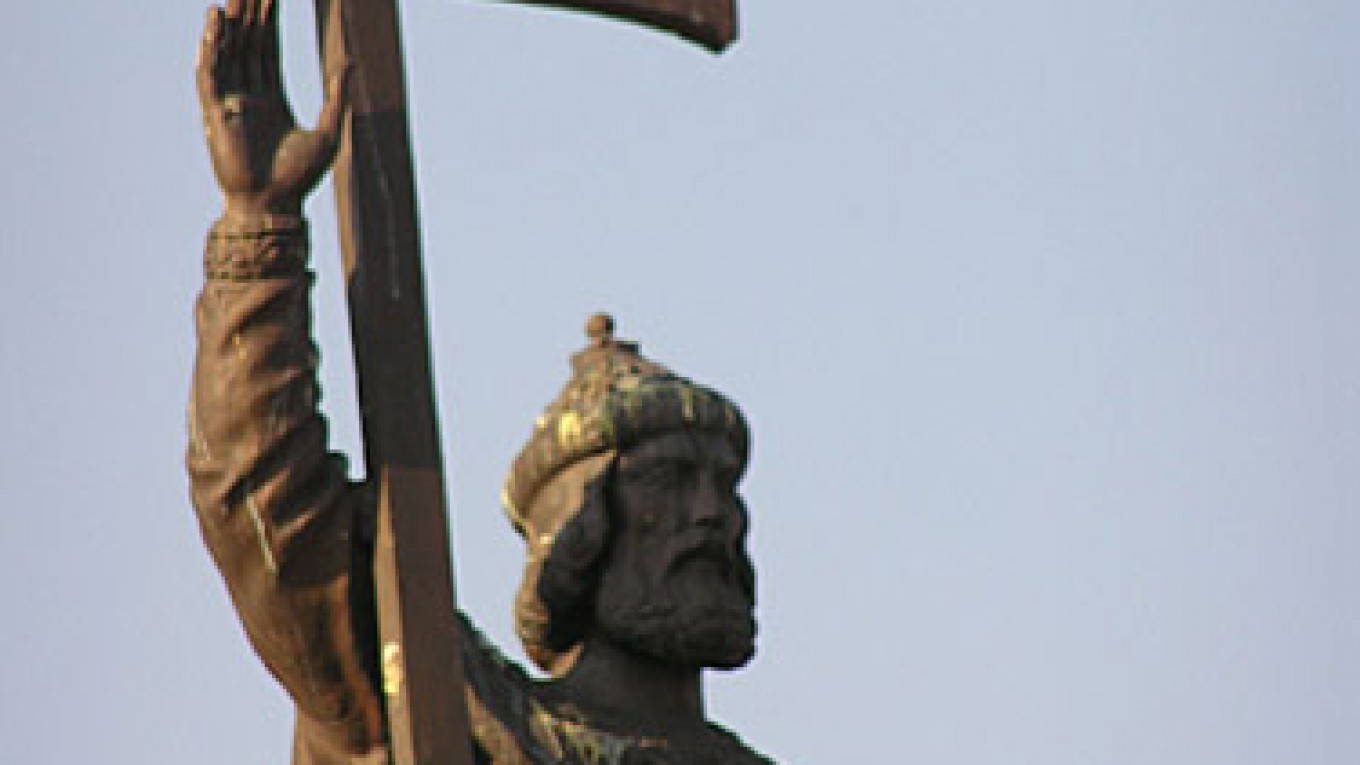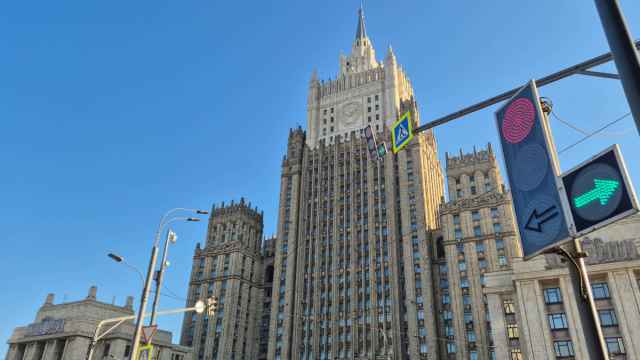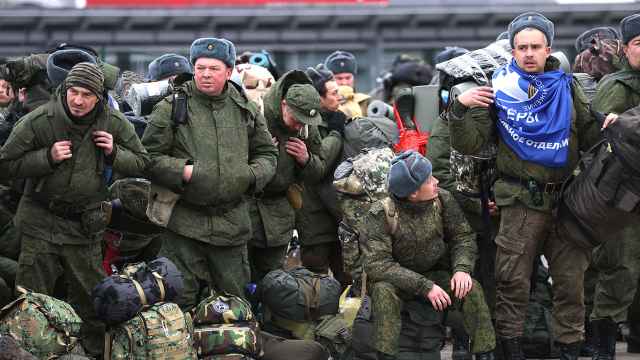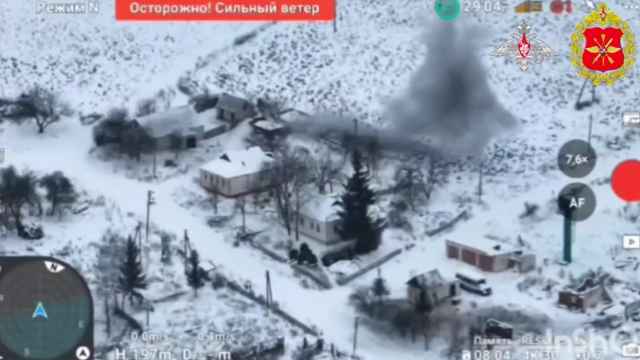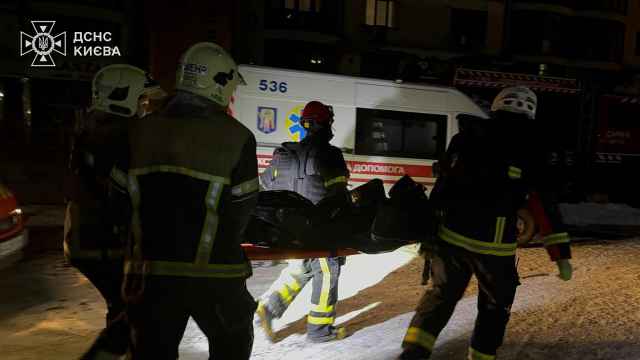The growing controversy around plans to erect a colossal statue of Prince Vladimir, the Kievan Rus ruler who converted pagan Rus to Christianity in the 10th century, took a new twist this week when the monument's supporters unexpectedly backed down from plans to put it up in front of Moscow State University.
The Russian Military History Society, which initiated the statue's creation last year, submitted a proposal to the City Duma on Monday to find an alternative spot for the monument, which had been due to tower over Moscow from Vorobyovy Gory (Sparrow Hills).
"There are geological risks. They can be dealt with, I guess, but if it costs too much, alternative places for the monument should be considered," Vladislav Kononov, deputy director of the Russian Military History Society, told The Moscow Times on Wednesday.
He said that the organization hasn't given up on the idea of Vorobyovy Gory completely, however, and a final decision is yet to be made.
Culture Minister Vladimir Medinsky, who is also the chairman of the history society, supported the proposal to find another site for the monument, calling the idea "reasonable."
A Ruined View
The idea to install a 24-meter-high bronze sculpture of Prince Vladimir on the viewing platform directly in front of the iconic main building of Moscow State University (MSU) in western Moscow had elicited protests from Muscovites. The statue would have encroached on one of Moscow's signature views, protesters said.
Local residents started a petition against the installation of the monument that had gathered almost 60,000 signatures by Wednesday. Another 2,000 signatures were collected by students and professors of MSU.
Just last week, there were few signs that the plan would ever be reconsidered. A group of Orthodox activists launched their own petition in support of the project, and took 52,000 signatures — 10,000 more than the opposing petition had gathered at that time — to the Moscow Сity Duma. The viewing platform had already been closed, reportedly in order to start reinforcing the hill in preparation for the statue's arrival, and there were no indications the authorities would change their minds.
The statue saga began in October last year, when the Moscow City Duma approved without any fuss a proposal from the Russian Military History Society to create a statue of Prince Vladimir, also known as Vladimir the Great, to be erected in Moscow to mark the 1,000th anniversary of his death this year. The project only attracted widespread attention in December, when all the details had been finalized.
Some political analysts said the Kremlin was using the statue to give an extra boost to the historical identity of the Russian people in the ongoing rift between Moscow and Ukraine: It was on the territory of modern-day Ukraine that Prince Vladimir lived and ruled.
Kiev has its own gigantic monument to the prince, but the one planned for Moscow is due to be considerably taller.
Location, Location, Location
The Russian Military History Society planned to erect the statue on Lubyanskaya Ploshchad, but the Moscow City Duma opposed the idea, so an alternative solution was found: to install the monument at Vorobyovy Gory. The spot appeared to be perfect: from there, the giant Vladimir would overlook the city and would be seen from miles away.
But the decision proved controversial from multiple points of view.
The spot is located on the border of two areas where major construction is prohibited — the Vorobyovy Gory natural park and Moscow State University, a cultural heritage site, said Rustam Rakhmatullin, coordinator of the Archnadzor conservation movement.
"The law on cultural heritage sites says very clearly that any major construction on the territory of such sites is not allowed," he said.
The law, he said, is supposed to ensure the preservation of cultural heritage sites as their creators envisaged them.
"It's OK to put up busts of scientists and small statues in front of the university buildings because that goes with the creator's idea of what the whole area is about," said Rakhmatullin. "But a gigantic object like this monument is just alien to it."
Another possible problem cited by opponents was the risk of a landslide.
"It's been confirmed by a lot of research that Vorobyovy Gory is a very unstable area that is almost constantly in danger of landslides," said Irina Abalkina, co-chair of the local residents' association that started the petition against the monument. "We wrote to the authorities about our concerns, but we got elusive answers. They just say 'We have a lot of experience in construction. It is all going to be fine,' but they don't give us any actual evidence," she said.
Such fears may be unfounded, according to Dmitry Zhuravlev, a prominent Moscow architect: Construction technology is more sophisticated now than before, making it possible to build major objects on sites previously considered dangerous.
Footing the Bill
Another objection raised by some residents was the cost of the project.
"The thing that bothers me is that our city government is going to do it using taxpayers' money," said Zhuravlev. "No one asked residents if they were OK with spending money on this."
While the Russian Military History Society is collecting donations to pay for the statue's installation, reinforcing the hill to prevent it collapsing under the weight was going to cost the city budget about 400 million rubles ($7.5 million), according to City Hall's procurements website.
Culture Minister Medinsky said Wednesday that reports about City Hall paying 400 million rubles for the installation of the monument were fake and made up by the media, apparently unaware that the figure was listed as the starting price on the procurements website.
It was not immediately clear whether the city government will still pay 400 million rubles for the hill's reinforcement. The viewing platform remained closed, though it was not clear what work is being done there.
According to zakupki.gov.ru, the state tenders website, the procurement process was concluded on May 27, and the tender was won by the company Mosinzhproyekt.
Spokespeople for City Hall's construction department, listed as the customer for the tender, were unable to confirm whether the results of the tender would be annulled and whether work to reinforce the hill would still go ahead.
Repeated calls to City Hall's Association of Administrative and Technical Inspection Offices to clarify the fate of the land and tender went unanswered this week.
The Moscow City Duma will consider alternative homes for Prince Vladimir next month. Right now it's too early to say where those locations might be, Kononov said Wednesday.
In the meantime, the creation of the monument is going ahead according to plan. A real-size clay model was presented to journalists last week.
"We need 100 million rubles ($1.8 million)," Kononov told journalists at the presentation. "So far, we've raised only 20 million."
Bikers' Hangout
Another group of people who may welcome a decision to move the statue are the city's bikers, who currently gather at Vorobyovy Gory. For years they have occupied the left half of the viewing platform, holding parties, competitions and other events there. The plans to put up the statue in their hangout prompted speculation they would have to start meeting somewhere else.
"There are a lot of different biker communities in Moscow and a lot of places for them to gather," said motorcyclist Mark Kozhura. "But Vorobyovy Gory has always been a traditional meeting place — not only for motorcyclists, but for tourists as well. Why do they need to change this tradition?"
Kononov of the Russian Military History Society said the bikers wouldn't have relocate.
"We invited Alexander Zaldostanov, leader of the Night Wolves motorcycle club, to our discussions about the project specifically to find out what bikers have to say about it, and he fully supported the project," said Kononov.
He added, however, that with the arrival of a monument to the man who baptized the country and who is now venerated as a saint, certain behavior associated with the bikers — such as parties with scantily clad women — would have to stop. "It's about time we put this place in order," he said.
Kononov said the students and professors of Moscow State University who collected more than 2,000 signatures against the project and sent them to the president represent a minority opinion. There are more than 50,000 people working and studying at the university, and only 4 percent of them are against the monument, he said.
"I didn't sign the petition against the monument," said Dmitry Zamolodchikov, an ecology professor at the biology faculty of MSU. "Twenty-four meters is not as high as, for example, the 98 meters of the Peter the Great monument [in downtown Moscow]. I don't see any geological or ecological threat here, especially if they lay adequate foundations."
Contact the author at [email protected]
A Message from The Moscow Times:
Dear readers,
We are facing unprecedented challenges. Russia's Prosecutor General's Office has designated The Moscow Times as an "undesirable" organization, criminalizing our work and putting our staff at risk of prosecution. This follows our earlier unjust labeling as a "foreign agent."
These actions are direct attempts to silence independent journalism in Russia. The authorities claim our work "discredits the decisions of the Russian leadership." We see things differently: we strive to provide accurate, unbiased reporting on Russia.
We, the journalists of The Moscow Times, refuse to be silenced. But to continue our work, we need your help.
Your support, no matter how small, makes a world of difference. If you can, please support us monthly starting from just $2. It's quick to set up, and every contribution makes a significant impact.
By supporting The Moscow Times, you're defending open, independent journalism in the face of repression. Thank you for standing with us.
Remind me later.


